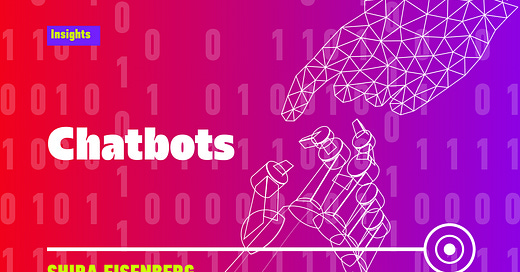By Mona Hamdy, CSO & Shira Eisenberg, intern
There has been a lot of hype lately with both Google and Microsoft rolling out new conversational AI agents for search. But what might conversational AI mean for web3?
DAOs
Discord has emerged as the go-to platform for most DAOs to interface with their members. With the help of GPT-3, the transformer model powering ChatGPT, DAOs can now build intelligent bots that engage with their members both one-on-one and in groups. Discord bots have a broad range of capabilities, but those powered by GPT-3 can help increase member engagement by introducing novelty and helping with important tasks.
A GPT-3 enabled bot can answer questions about a DAO's mission and activity. It can even search through chat logs for vital information and summarize recent discussions to save time. Furthermore, it can assist with maintaining organizational health. However, there is a risk that overreliance on bots may dehumanize the experience.
Overall, while the introduction of GPT-3 enabled bots can undoubtedly improve DAO engagement, it is essential to strike a balance between automation and human interaction.
Kenneth Cavanagh, who leads people analytics at SpaceX, is the head of Project LION, a project seeking to bring psychometrics to web3 in the name of measuring DAO Health via reading discord communication data. Psychometric surveys are traditionally used in the organizational setting to measure the health of a workforce in order to optimize for more happiness, engagement, productivity, and retention.
Ultimately, these tools are used to improve the overall employee experience, which in turn, improves a company's bottom line. But surveys come with a time cost that Kenneth believes can be mitigated with the power of large language models that can simulate organizational behavior. The extensions of this kind of technology is especially prudent for DAOs who more heavily rely on building good community experiences to retain contributors. Applications for this kind of technology could extend even further to matching DAO members to tasks that best suit their skills or to teams to optimize for complementary skill sets in a given project.
Bots could also help bridge the gap between DAOs. By exposing a GPT-3 agent to DAO information for multiple DAOs, one might find interesting opportunities for collaboration and cross-DAO activities.
Within a single DAO, a conversational bot becomes a resource and a personal search engine for information about the DAO, its activities, mission, and more. Conversational bots can even help with drafting governance proposals.
Bots could also help personalize the DAO experience for each user.
Gaming
Conversational agents could be huge for web3 gaming. Imagine engaging with virtual characters while on quests to earn crypto or NFTs.
GPT2 has even been used for procedural content generation, creating new Super Mario Bros levels from text prompts. This could easily be extended to crypto gaming, enabling countless new levels and experiences to enjoy.
NFTs
Interactive NFTs could deploy conversational AI technology to allow owners to engage with their tokens directly, to speak with the characters they own. This could make for an appealing ownership experience and bring characters to life.
On-Chain Activity
Imagine a conversational agent exposed to on-chain data. One could easily query the agent about on-chain activity with natural language as opposed to having to look through blocks and countless transactions.
This would make on-chain data more accessible to a broader audience. There are already conversational AIs that allow you to talk to code.


